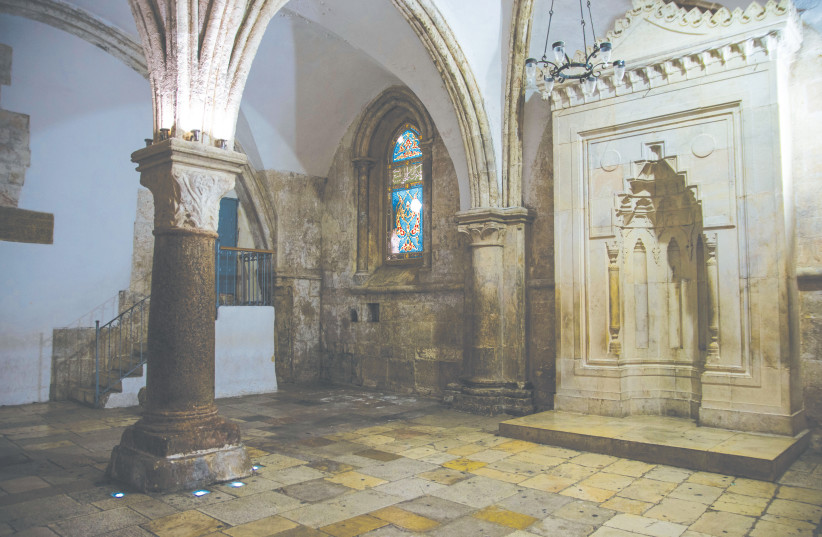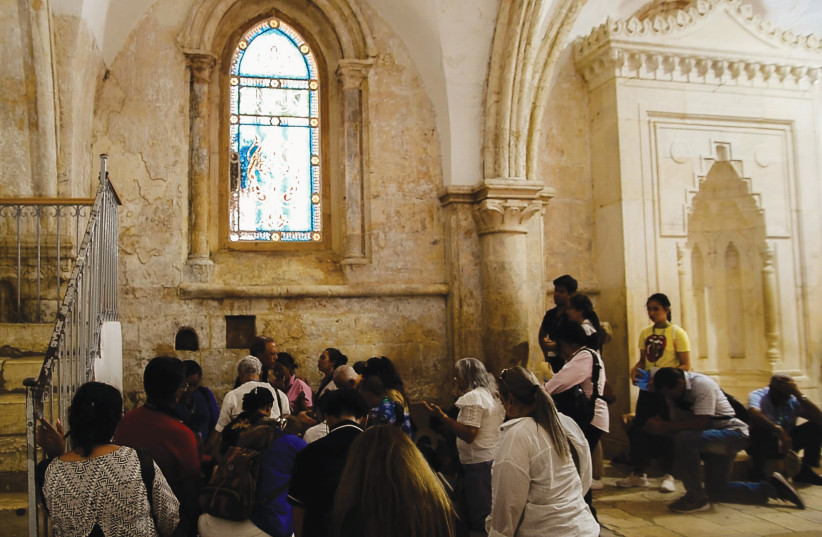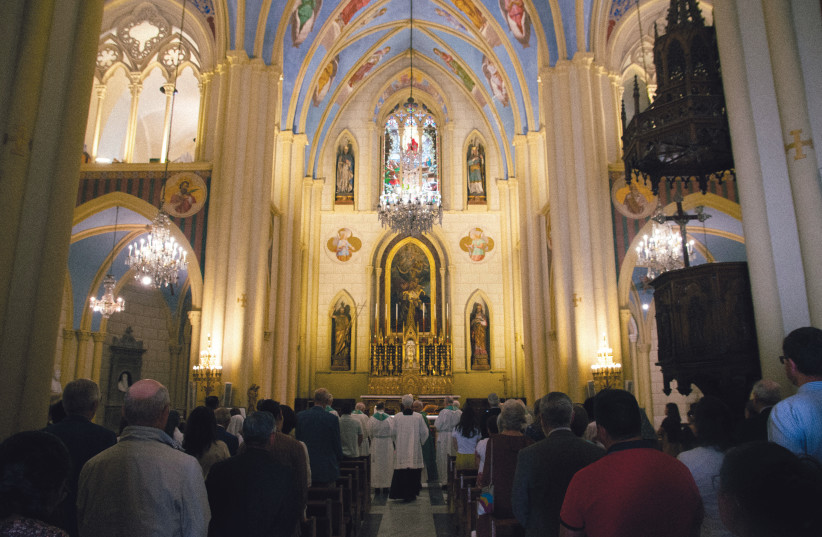Jerusalem Christians say they’re under attack – will Israel help?
Brother Alberto Pari has been spat on and taunted as he walks on the streets in Jerusalem.
“Forgive me, Father, for I have sinned,” youngsters have jeered.
When he first arrived in Jerusalem in 2007, he didn’t experience such behavior; but once he attained brotherhood after a year of study, he donned a traditional long black robe, which made him a visible target.
“It becomes clear you’re a religious monk” and as a result, also a target for random acts of violence, said Pari, the general secretary of the Custodian Terra Santa.
“It’s gotten worse in the last year,” he added, as he recounted that just a day earlier an Orthodox-looking Jewish boy spat at him as he ran by.
 OTTOMAN-ERA window sits fractured in the Room of the Last Supper. (credit: I.H. Mintz)
OTTOMAN-ERA window sits fractured in the Room of the Last Supper. (credit: I.H. Mintz)In the first three weeks of July alone, there had been 17 separate reported acts of discriminatory acts against Christians countrywide, as reported by independent researcher and activist Yisca Harani. It included acts of spitting, verbal abuse, vandalism, and stone-throwing.
“Things are happening daily,” said Harani.
Removal of the cross
The incidents Harani recorded included a highly publicized one in which a female usher at the Western Wall plaza asked the abbot of the Dormition Abbey in Jerusalem, Nikodemus Schnabel, to remove the large cross he wore over his black robe because it was “really big and inappropriate” for this “Jewish place.”
Journalist Christopher Schult of the German paper Der Spiegel videoed the incident and shared it on Twitter. Schnabel was stopped as he accompanied German Education Minister Bettina Stark-Watzinger to her car at the Dung Gate. He had not intended to pray at the Western Wall, but rather the group was passing by the outer edge of its exterior plaza.
Schnabel responded that the cross was part of his religious dress code. “I’m a Roman Catholic abbot. You want me to not dress as my faith tells me I should dress.” The Western Wall Heritage Foundation, which controls the Western Wall and its plaza, later apologized.
The apology, however, did not diminish the significance of the incident for Christians, given that it came at a time when they already felt under increasing attack, particularly in Jerusalem’s Old City, where they are highly visible.
Those interviewed by the Magazine said they felt that violence was growing, with incidents of vandalism at the Tomb of the Virgin Mary and the Church of the Flagellation, the Protestant Cemetery, and the Armenian Monastery.
Amir Dan, a spokesperson for the Custodian Terra Santa, said that “Over the last half year, it seems that the extremists feel like they can do whatever they want – as if they have a commission to do this… all over the country, not only in Jerusalem.”
 TOURISTS GATHER in the Room of the Last Supper: Some under impression damage was ancient, not recent. (credit: I.H. Mintz)
TOURISTS GATHER in the Room of the Last Supper: Some under impression damage was ancient, not recent. (credit: I.H. Mintz)The room of the Last Supper
Last month a Jewish man, who was later arrested, threw a rock through an Ottoman-era window in the Christian Cenacle, known as the Room of the Last Supper.
According to Christian tradition, the Cenacle is where the Last Supper took place, as well as where the Holy Spirit returned following the crucifixion of Christ. The room – a stone room with high arched ceilings – sits on the same site as King David’s Tomb. Visitors include tourists and pilgrims from around the globe. It can be reached by climbing an obscured flight of stairs, passing a lone security guard who sits in a welcome way, and then entering the room, following a short outdoor stretch.
When the Magazine visited the site after the attack, it was packed with dozens of tourists, mostly Christian. On one visit, a Spanish-speaking tour group knelt in prayer before the window.
On another visit, a group of Americans, Latinos, and other international pilgrims, sat with a tour guide, who explained what happened to the window. The crowd gasped. Some held their chests. For them, the site holds immense holiness, and such an act of violence against it would be unfathomable.
“It is shocking,” said Aurel Somlyody, a young Hungarian tourist who had come with a group of friends. The group thought the vandalism had been centuries old. “Doing something like that on purpose – it’s a hate crime,” he said. “Regardless of the religion, if he intended to break the window, even if he was drunk, he should be punished.”
The suspect – a Jewish man in his 30s – was released under restrictive conditions. Some have gone as far as to say that the man could be identified as someone with Jerusalem Syndrome (a mental phenomenon involving religiously themed obsessive ideas, delusions, or other psychosis-like experiences triggered by a visit to the holy city), according to those familiar with the matter.
Police and city response
A spokesman for Protecting Holy Land Christians (an ecumenical campaign assembled by the Patriarch of Jerusalem, along with the Council of Patriarchs and Heads of Churches in Jerusalem) said his organization had noted a spike in hate crimes already in 2021, such as the blocking of churchgoers from entering churches and fresh graffiti reading “ Christians go to hell” and other expletives.
Speaking with the Magazine, Chief Superintendent Assaf Harel, head of intelligence and investigations of the David Precinct, said he hadn’t seen a significant spike in incidents in the capital. Dean Elsdunne, the Israel Police’s international spokesperson, interpreted Harel’s comments.
“He doesn’t feel, as someone who is there all the time, the rise in the number of incidents that are happening. He sees more of a rise in the media coverage of incidents.”
The police were not able to provide data about hate crimes against Christians either in Jerusalem or in the country.
Jerusalem Deputy Mayor Fleur Hassan-Nahoum was quick to condemn such hate crimes. These instances are the activities of “hooligans,” she stressed.
“We noticed a rise about a year ago in [such activity] and property damage among extremists.” Last December, she hosted a meeting in the Old City that led to more police accountability and presence.
Such hate crimes should come with “real consequence,” she affirmed, stating that police have been able to be more vigilant about the issue.
Present at the meeting were “residents from all backgrounds and religions [who] came to speak about issues in the Old City,” said Hassan-Nahoum. The Jerusalem Development Authority and the Project Management Institute representatives were also in attendance.
In an attempt to tackle the matter, activist Harani led a conference titled “Why Do (Some) Jews Spit on Gentiles?” It garnered media and municipality attention, largely because of its provocative title. Ultimately, it was boycotted by the Foreign Ministry, which is responsible for Christian relations, said Harani.
The Foreign Ministry, one of many authorities in Israel that work to improve Christian-Jewish relations, said the issue it had with the conference was its title.
Harani explained that attacks against Christians are not a new phenomenon and have existed since the inception of the state. Christians have long been a target due to being a minority in the Jewish state, she stated, claiming it is rooted in a Jewish trauma response to “the pogroms, the Inquisition, and the Holocaust.”
“What it means to be a loyal Israeli is to be Jewish – which [according to this cohort] means you’re anti-Christian,” insinuating that rhetoric surrounding religious Israeli identity means espousing ideas of conviction and hatred.
“[Israeli] Educational mentions of Christianity [solely] mention it through the lens [and in the context] of traumatic life in Europe,” said Harani, which ultimately leads to bigotry and a lack of understanding. Such insensitivity comes from a lack of exposure to other religions and cultures, she explained.
Benjamin David, communications director for Christ Church, has lived in Jerusalem his whole life and has also seen a rise in acts against Christians. “It feels like it used to be more of a live-and-let-live type of atmosphere, especially in the Old City, and that idea as a value seems to be slightly eroding,” he said.
“We believe that the only one that can actually prevent these things is the police,” said Hana Bendcowsky, director of the Jerusalem Center for Jewish-Christian Relations in the Rossing Center for Education and Dialogue. She called for the police to “be harsh” with the vandalism cases.
Bendcowsky recognized that there is a police presence but said, “They don’t make the effort to come and listen to the complaints; they don’t make the effort to send more policemen, and that’s something that we find very problematic,” referencing a potential hit to tourism and Israel’s economy.
 FATHER JOAQUIN PANIELLO stands before the Latin Patriarchate of Jerusalem. (credit: I.H. Mintz)
FATHER JOAQUIN PANIELLO stands before the Latin Patriarchate of Jerusalem. (credit: I.H. Mintz)A Tourism Ministry representative confirmed that it certainly has affected tourism, according to a source familiar with the matter.
“It affects the Israeli country. When someone breaks a statue of Jesus, it is seen by millions of Christians around the world,” said Dan, the aforementioned spokesperson of the Custody.
“It’s always the same [police] response: That ‘it’s only a few isolated events and that the attacker is mentally unstable.’”
Tour guide Nizar Halloun, who was born in Jerusalem and is a current resident, said he also feels the issue has gotten worse in recent years. Disputes over land control in the Old City become contentious due to the necessity to share holy spaces, he said.
Bendcowsky brought up the fact that it is uncertain what occurs to those who are arrested: “They [the police] see people spitting, and they don’t do anything. They will not arrest them.”
“Any incidents brought to police attention… are taken care of and are handled seriously,” said police spokesperson Elsdunne. He said the cases are usually of spitting on the sidewalk or buildings next to Christians, and these actions cannot be enforced unless there is a clear breaking of the law, despite it being “disturbing behavior.”
Education and condemnation from religious leaders are the way forward, Halloun said – and other experts agree.
High-level condemnations
On May 28, Chief Sephardi Rabbi Shlomo Amar condemned such acts in a rare English-language written statement: “Irresponsible people who are not at all observant of the Torah and its ways did this,” it reads. “We announce that such behavior is strictly forbidden.”
In July, Foreign Minister Eli Cohen visited Italy and met with the Vatican’s Foreign Minister Archbishop Paul Gallagher, pledging to protect the safety of Christians in Israel and maintaining freedom of religion and worship.
“We are committed to maintaining the safety and dignity of Christians in Israel and will continue to do so and show zero tolerance towards cases of violence based on hate,” Cohen emphasized, during what was the first such visit by an Israeli foreign minister in 12 years.
MK Dan Illouz of the ruling Likud party blamed the issue on a “small minority of people who are absolutely crazy.”
He added, “We have to [act with] a forceful hand against people who do these things, but obviously it doesn’t reflect the values of our society.”
But there are those who argue that the current makeup of the government has seemingly ignited the situation.
More action needed
MK Ofer Cassif (Hadash) submitted a request for a Knesset discussion of the issue, along with MK Yoav Segalovich (Yesh Atid) and others. Knesset Speaker Amir Ohana (Likud) and his deputies denied their requests, said Cassif.
The Knesset’s Public Security Committee, which this year discussed violence against members of the LGBTQ community, has not held a meeting on hate crimes against Christians.
“We need our elected leaders at the national level and at the municipal levels to condemn [these acts],” said Tami Lavie Nissim, director of partnerships at the Jerusalem Intercultural Center, which facilitates city-wide coexistence and cross-cultural understanding.
“It is time that we take this subject seriously … because of this political climate that we have [the issue] is going to grow to unbelievable new records,” Harani said. “The damage [of not pointing this out] is that we are letting these things happen [and continue to happen].”
David pushed back on the idea that the recent coalition transition alone has brought widespread attitude changes. But “if you look at some of the people who commit these acts, and you hear their testimonies in court or what they say to news outlets, it does seem that on a discourse level, they do seem emboldened by the trend in Israeli politics as well.”
“Acts of violence or of disrespect that are done on premeditated religious grounds [need to have stricter punishments],” he said. “I think the law needs to get a lot stricter.”
Nissim continued, “If there are violent cases, we must treat them in a serious way. A key to that is a discourse with specific ultra-Orthodox leaders… It’s a matter of the right rabbi [condemning such acts of violence].”
Church minister and scholar Joaquin Paniello, who has lived in Jerusalem for 13 years, said that acts against Christians have been increasing in the last two years. Father Paniello calls for a “culture of collaboration and understanding” to ease tensions.
“It would be good for authorities to be very attentive to who these people are and how this can be prevented,” he noted. “The more Jerusalem is able to live in peace, the rest of Israel will be the same, and [there will be peace] in the world.” ■





Comments are closed.